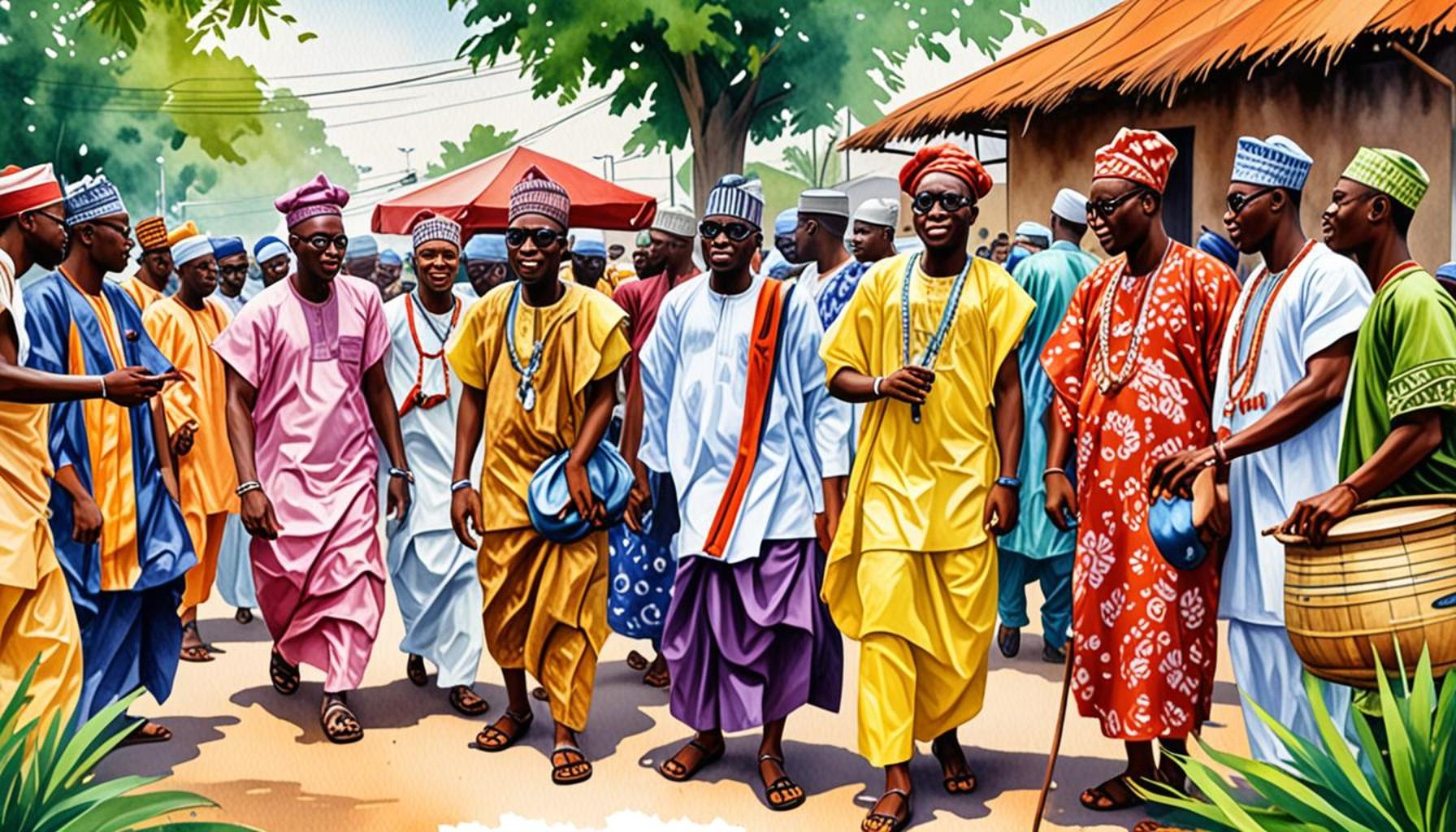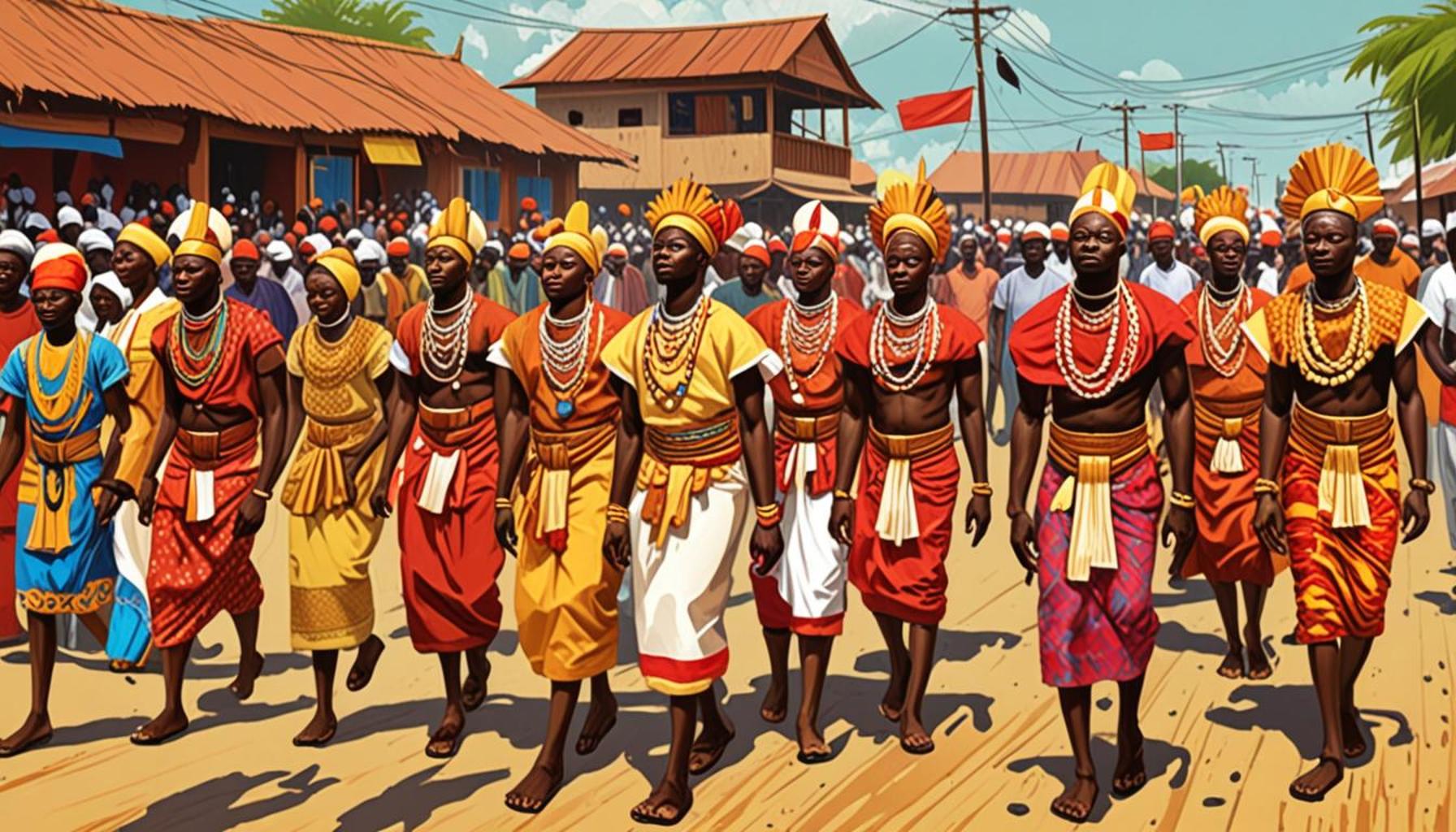Explore Nigerias Local Culture Tour Itineraries Festive Traditions

Introduction
Experience the vibrant tapestry of Nigeria’s local culture through its rich traditions and lively festivals. As one of Africa’s most diverse nations, Nigeria offers an array of cultural experiences that attract tourists seeking to connect with the authentic essence of its people. From breathtaking ceremonies to culinary delights, exploring these cultural itineraries can transform a simple trip into a profound journey.
Understanding the relevance of cultural tourism is essential for travelers looking to immerse themselves in local lifestyles. Engaging with traditions and festivals not only enhances the travel experience but also promotes respect and appreciation for the host community. Note the striking festivals celebrated across the country that provide unique opportunities for engagement and understanding.
In this guide, we will unveil the Top 5 cultural itineraries that celebrate Nigeria’s most cherished traditions and festivals. Get ready to discover how you can experience the soul of Nigeria, from the north to the south, and everything in between.
Top 5: Discovering Local Culture – Tourist Itineraries Celebrating Nigerian Traditions and Festivals
Exploring Nigeria offers a unique canvas of vibrant cultures and traditional festivities. The country’s rich heritage is marked by various ethnic groups, each presenting distinctive customs and celebratory events. Here, we bring you the top five itineraries that amplify the experience of local culture in Nigeria, taking you on an exhilarating journey through traditions and festivities.
5. Yoruba Heritage Tour in Lagos
The Yoruba Heritage Tour in Lagos offers an immersive experience into the rich traditions of the Yoruba people, one of Nigeria’s largest ethnic groups. This itinerary promises not only historical exploration but a deep dive into the ancient and contemporary life of the Yoruba people. Visitors can begin their journey in Idanre Hills, a UNESCO World Heritage site that showcases breathtaking views and historical significance. These mysterious hills are crowned with numerous peaks, ancient inscribed stones, and offer stories that harken back to early humans in West Africa.

The tour typically includes stops at various cultural landmarks in Lagos such as the National Museum, where guests will find artifacts that tell the story of the Yoruba nation. The museum houses an extensive collection of Nigerian art, including terracotta, bronze, and traditional clothing patterns that trace the history of the Yoruba and other ethnic groups from pre-colonial times to modern Nigeria.
In addition to exploring history, participants often engage in lively marketplaces like Balogun Market, where they can witness firsthand the colorful fabrics and handicrafts that are quintessential to Yoruba culture. Rich and vibrant materials like ankara and asoke are not only commodities but also tell cultural stories through their patterns. Don’t miss the opportunity to witness a traditional Yoruba wedding ceremony, a dazzling display of ceremonial attire, music, and dance. The exchange of vows is accompanied by rich folklore, poetry, and dance, which are vital elements of Yoruba culture.
4. The Calabar Carnival Experience
The Calabar Carnival draws locals and tourists alike into the heart of southern Nigeria, transforming the city of Calabar every December into a vibrant celebration of culture and lifestyle. Dubbed as “Africa’s Biggest Street Party,” this month-long event features extravagant parades where different groups showcase elaborate costumes, traditional dances, and vibrant music that encapsulate Calabar’s rich heritage.
One cannot discuss Calabar without mentioning its rich tapestry of history. Visitors can explore the Calabar Slave History Museum, which sheds light on the region’s important role during the transatlantic slave trade. The museum includes poignant exhibitions displaying items from the slave era, as well as galleries that educate on the resistance and resilience of the African people.
No experience is complete without sampling the culinary delights prevalent at the carnival. From efik pepper soup to the fiery and exquisite jollof rice, Calabar’s food scene is indeed a multi-sensory delight. These dishes, spiced with rich local flavors and fresh ingredients, are a testament to the creativity and resourcefulness of the Nigerian people. The Calabar Carnival is more than a mere festival; it’s an invitation to engage with the heart of Nigerian culture through a sensory exploration.
3. The Osun-Osogbo Festival
The Osun-Osogbo Festival, celebrated annually in Osogbo, Osun State, is a significant cultural event that honors the goddess Osun, revered as the source of fertility and prosperity. This vibrant festival typically takes place in August and attracts thousands of visitors from around the world, eager to partake in one of the most spiritually profound events in Nigeria.
The festival begins with a sacred procession led by the Arugba (a virgin girl), who carries offerings to the shrine of the goddess. This procession isn’t just a religious ritual; it is a symbolic portrayal of protection and guidance for the town and its people, blessed by the goddess Osun.
Attending this festival offers profound insight into Yoruba spirituality and the connection between its people and their deities. Participants can witness an array of traditional dances and music, forming an integral part of the festival. The voices of choristers echo the – sometimes sorrowful, sometimes joyful – melodies that recount the rich folklore of Yoruba deities. Engaging with local artisans who create traditional crafts and visiting the sacred groves further enhances the experience. The festival concludes with memorable music and dance performances that evoke the mystical stories tied to the goddess Osun, making it an unforgettable experience.
2. The Durbar Festival in Northern Nigeria
The Durbar Festival, celebrated in cities such as Kano and Katsina, showcases the grandeur of traditional northern Nigerian culture. This extravagant festival, often featuring parades of horsemen clad in intricate costumes, underscores the region’s rich Islamic heritage. It is a vibrant spectacle celebrated with enthusiasm and pride, usually coinciding with Islamic celebrations like Eid al-Fitr and Eid al-Adha.
The Durbar is an excellent opportunity for tourists to appreciate the artistry in traditional northern attire, which includes baba robes accessorized with intricate caps. These elegant costumes bear testimony to the skill and creativity of local artisans who weave in threads of cultural pride and identity into every attire.
The horsemen, often carefully selected, showcase their equestrian skills amidst a backdrop of thrilling traditional music, creating an electrifying atmosphere throughout the celebrations. Beyond the colorful spectacles, the Durbar is a testimony to communal solidarity and reflects the values of respect, honor, and tradition deeply embedded within northern Nigerian society.
1. The Aso Oke Festival
Topping our list is the Aso Oke Festival, which takes place in the southwestern region of Nigeria, specifically in the Oyo State. This festival celebrates the Aso Oke fabric, a handwoven textile of historical and cultural significance among the Yoruba people. It is here that the art of weaving reaches its zenith, visualized through the vibrant, intricate patterns of Aso Oke.
Guests visiting the festival enjoy a range of activities, including fashion shows that showcase innovative designs made from Aso Oke. The designers blend modern styles with traditional elements, portraying a fusion of the old and the new. Traditional songs and dance performances enrich the atmosphere, highlighting not only the exquisiteness of Aso Oke but also its cultural storytelling attributes.
What makes the Aso Oke Festival particularly engaging is the range of workshops and exhibitions dedicated to the ancient art of weaving. Attendees can participate in hands-on experiences, learning from local artisans who have perfected their craft over generations. Furthermore, this festival emphasizes community, as families and friends gather to celebrate, reinforcing social bonds while underlining the importance of cultural heritage.
Whether it is through learning the craft of textile weaving, savouring the tantalizing tastes of communal cuisines, or relishing the mesmerizing beats of ethnic drumming, each of these itineraries brings to life the manifold dimensions of Nigeria’s cultural identity. In embarking on these journeys, travelers are invited to not only witness but partake in the timeless traditions that continue to shape the social and cultural fabric of this remarkable nation.
| Category | Details |
|---|---|
| Cultural Immersion | Travelers experience Nigeria’s rich heritage through direct involvement in local traditions, creating unforgettable connections with the communities. |
| Festivals and Celebrations | Festivals such as the Osun-Osogbo and Calabar Carnival showcase vibrant parades, music, and drama, offering insight into Nigeria’s diverse cultural landscape. |
| Traditional Cuisine | Traveling through Nigeria allows visitors to savor local dishes like Jollof rice, Pounded yam, and Suya, each telling a story of the region’s history and creativity. |
| Art and Craftsmanship | Nigeria’s artisans produce stunning works in bead-making, weaving, and pottery. Engaging with these crafts promotes appreciation for indigenous techniques and the narratives behind each piece. |
Exploring the local culture through itineraries that celebrate Nigeria’s traditions and festivals reveals not only the vibrant social fabric of the country but also its enduring spirit. With each festival, cultural immersion deepens, allowing tourists to discover a nation rich in history and diversity. The significance of festivals, such as the iconic Osun-Osogbo, transcends mere celebration; they are profound reflections of indigenous beliefs and communal pride. These events draw crowds, intertwining the local populace with visitors in joyous festivities, painting a vivid picture of Nigeria’s unified yet diverse identity. Furthermore, Nigeria’s culinary landscape offers an in-depth adventure of flavors. Each dish carries the heritage of the regions they originate from, showcasing the culinary arts passed down through generations. The smoky and spicy notes of Jollof rice or the comforting texture of Pounded yam provide a direct window into the culture, inviting everyone to partake in this flavorful journey.Art and craftsmanship are also key elements of Nigeria’s cultural expression. The skill and talent demonstrated by local artisans in areas like bead-making and weaving tell stories of ancestral traditions, contributing to the global appreciation of Nigerian artistry. This allows for a deeper connection with the people and places visited, fostering respect for their heritage and creativity. In essence, traversing Nigeria through its cultural itineraries enriches not just the tourist’s experience, but also bolsters the communities that preserve these vital traditions, creating an ecosystem where culture thrives and evolves. Each journey into the heart of Nigeria is a unique exploration of its legacy, bringing the past into the present while paving the way for future generations to celebrate their roots.
Frequently Asked Questions About Exploring Local Culture and Traditions in Nigeria
What are some of the most popular festivals in Nigeria that tourists can experience?
Nigeria is a vibrant tapestry of cultures and traditions, each celebrated through a variety of lively festivals. Some of the most notable include the Durbar Festival in the northern regions, which features regal horse parades, and the colorful Osun-Osogbo Festival centered around the sacred Osun River. The annual Eyo Festival in Lagos is also a spectacle worth experiencing, with its masked processions showcasing riverine cultures. Each festival provides a window into Nigeria’s myriad of cultural expressions and heritage.
How can travelers join in local traditions and celebrations in Nigeria?
Joining in local traditions and celebrations in Nigeria often requires prior planning and coordination. Travelers should seek out local tour operators who specialize in cultural tours or engage with community hosts who can offer insights and access to traditional events. Additionally, participating in local customs such as traditional dress codes or rituals like the “Breaking of the Kola Nuts” ceremony can enhance the experience. Respectful engagement is essential, acknowledging local customs and seeking consent from hosts.
Are there any specific regions in Nigeria known for their unique cultural practices?
Indeed, Nigeria’s regions each exhibit distinctive cultural practices. For instance, the Yoruba region in the southwest is renowned for its elaborate ceremonies and art, while the Igbo area in the southeast is famous for its masquerade festivals. In the northern region, the Hausa and Fulani people are known for their traditional music and the unique sport of wrestling. Each area offers a distinct cultural flair, beckoning travelers to explore beyond the surface.
What should tourists consider when planning a cultural itinerary in Nigeria?
When planning a cultural itinerary in Nigeria, tourists should consider the timing of visits to align with major festivals and events. It’s important to research and understand the local customs and traditions, as well as any possible restrictions. Safety and health precautions should be noted, particularly in more remote areas. Working with knowledgeable local guides can provide invaluable insights and ensure a more connected and respectful engagement with the communities visited.
How can cultural tourism in Nigeria contribute to local communities?
Cultural tourism can significantly benefit local communities by providing economic opportunities and fostering pride in indigenous traditions. By participating in community-led tours and staying at local accommodations, tourists can ensure that their contributions support local economies directly. Moreover, cultural exchanges inspire preservation efforts and sustain the cultural diversity that makes Nigeria unique, making these interactions mutually beneficial.
Conclusion
As we explore the captivating world of Nigeria through its local culture, it becomes clear that the country’s rich tapestry of traditions and festivals offers a unique opportunity for tourists to immerse themselves in an authentic and vibrant cultural experience. Nigeria’s diverse regions boast a multitude of ceremonial events that not only celebrate the nation’s heritage but also foster a deeper understanding and appreciation of its multicultural identity.
The top five tourist itineraries highlight distinct aspects of Nigeria’s traditions: The breathtaking Durbar festivals that pulse with the rhythmic beat of horsemen, the colorful Osun-Osogbo Festival with its spiritual significance, the electrifying Calabar Carnival rich with creativity and energy, the New Yam Festival that honors agricultural bounties, and the Argungu Fishing Festival bringing communities together in a spectacular aquatic contest.
These events not only showcase Nigeria’s historical legacy and cultural uniqueness but also provide visitors with enriching experiences that go beyond conventional tourism. They invite tourists to engage with local communities, partake in ancestral practices, and develop a genuine connection with the people and stories that shape the nation.
In conclusion, the cultural wealth celebrated through Nigeria’s itineraries holds immense potential for tourism. For any globetrotter seeking to explore new horizons, an adventure through Nigeria’s festivals and traditions promises to be an enlightening journey. By delving deeper into these cultural itineraries, tourists can unlock the profound tapestry of Nigerian life, enhancing their own understanding of global communal histories and traditions.


